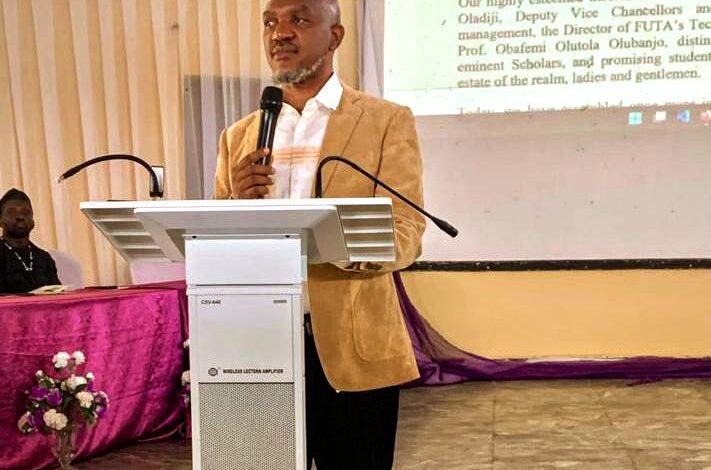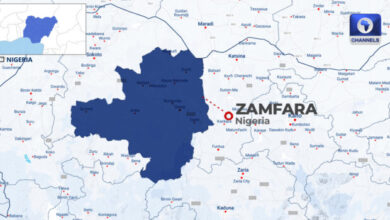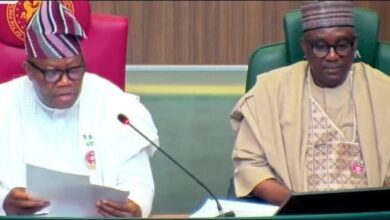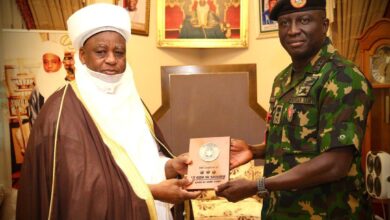SCIENCE, TECHNOLOGY, AND INNOVATION: Mandatory prerequisites for Nigeria’s competitive development, by Olatunji Ariyomo

BEING A KEYNOTE ADDRESS DELIVERED BY ENGR. OLATUNJI ARIYOMO, FNSE, AT THE 2025 TECHNOLOGY INCUBATION LECTURE TAKING PLACE AT THE THEODORE IDIBIYE FRANCIS AUDITORIUM THEMED “MORE THAN CERTIFICATE” ORGANIZED BY THE TECHNOLOGY PARK AND INCUBATION CENTRE (TECH-PIC), FEDERAL UNIVERSITY OF TECHNOLOGY AKURE, NIGERIA ON THE 19TH OF JUNE 2025
In conclusion, we are all aware of the threat posed by insecurity. Yet, as that agelong Yoruba saying goes, omo ti a ko ko, ni yoo gbe ile ti ako ta – a child we refused to properly educate preferring instead to build infrastructure will be the one to vandalise that infrastructure and pawn its parts at ridiculous prices.
Our highly esteemed madam Vice-Chancellor, Prof. (Mrs) Adenike Temidayo Oladiji, Deputy Vice Chancellors and other members of the FUTA management, the Director of FUTA’s Technology Park and Innovation Centre, Prof. Obafemi Olutola Olubanjo, distinguished Professors, revered guests, eminent Scholars, and promising students, respected members of the fourth estate of the realm, ladies and gentlemen.


Today, we have assembled once more in pursuit of clarity in the agenda to reshape the collective destiny of the Nigerian nation by making it globally competitive among its peers as a net contributor to global productivity through the evolution of well-structure scientific knowledge and its devotion to driving technology and innovation with the singular objective of comparable advantage and competitive development. There are no alternatives. Nigeria has only one path to growth and development – science. Put in context and with greater clarity – science, technology and innovation (STI). Our collective purpose is anchored in the realization that the trajectory of Nigeria’s sustainable development fundamentally hinges on our strategic embrace of science, technology, and innovation – that is, knowledge, know-how, and their applications to daily life.
To appreciate the urgency and significance of this pursuit, let’s first examine some recent compelling data. For Nigeria’s population of 228 million, the World Bank projected a growth rate of 3.6% for 2025, which could result in a GDP of around $585 billion. Relatively, this represents a positive outlook. The activities of the past months have demonstrated that there are indeed appreciable improvements in the country’s financial outlook. But this is still far below peer nations like South Korea and Singapore. South Korea’s GDP in 2025 is projected to be around $1.742 trillion USD. Some sources also indicate that the GDP could reach $1.950 trillion USD, and $3.390 trillion USD when measured using PPP (Purchasing Power Parity). South Korea’s population is 52 million.
In the first quarter of 2024, 14.4% of Nigerian youths aged 15-24 were neither in education (school), employment, nor training, according to Nairametrics (Youth NEET Rate). Nigeria’s youth unemployment rate was at 7% as reported by the National Bureau of Statistics (2024). Here lies our greatest challenge and, simultaneously, our most profound opportunity as it demands urgent innovative interventions. Through deliberate investment and prioritization of STI, we have the power not only to catalyze economic transformation but also to significantly reduce youth unemployment through innovation-driven enterprises.
Some 25 – 40 years ago, across Nigeria, many emerging technology institutions, specifically, polytechnics, were encouraged to maintain a ratio of 70:30 or 60:40 in favour of science-oriented or so-called technical courses as opposed to offering a plethora of courses in the arts, social sciences, and humanities. It is apparent that the thrust of the promoters of such policies was to encourage a sizable number of the emerging Nigerian youth population of the 80s and 90s to become technically capable and by so doing either become employers of labour or become seized with the requisite skills required to support the quest of the nation for industrialization.
Why is STI so supremely important? Can’t we just continue to buy what we need? After all, we can simply increase taxes, levies and tariffs as we often do in response to inflation, fund scarcity, balance of trade, and budget deficit. Then, we will be able to fund our budget deficits, give more money to states, increase salaries, etc. Then we will be able to fund our educational institutions. Then we will be able to fund our hospitals. Then we will be able to fund agriculture. Then we will be able to pretty much fund every aspect of our local and national life. So why bother about STI?
This is because the world is in a constant state of strife. If you do not strike – they will strike you. If you do not make, you will become their market. If you do not take advantage of your environment, they will take a vantage position over your environment and dictate to your disadvantage. Thus, in a competitive world, throwing money at a problem is an inefficient way of solving that problem and hasn’t ever proven to serve the larger strategic interest of the Nigerian nation since Nigeria became independent in 1960.
More importantly, the world operates by the agency of trade. It is simply in the best interest of any nation that seeks development to intentionally carve a niche for itself in the comity of nations and ensure it has substantial products and services that the rest of the world procures from it and which trade can sustain its domestic capacity to address the present needs of its people whilst also positioning its future generations for comparative advantages. This is how clever nations have ruled the world in the past 6,000 years.
While we can legitimately lament, we will get to see why we should be concerned as I shall be showing us two videos. Before then, however, I like to share some of the significant good news and arenas where Nigerians have been breaking ground. Two of the leading fintech companies in Africa at the moment are Flutterwave and Paystack. These are Nigerian-owned and Nigerian-born fintech behemoths that currently rule Africa leveraging technological innovation to redefine Africa’s financial landscape, collectively facilitating billions of dollars in digital transactions every year. Their success underscores a powerful truth: strategic deployment of technology and innovation can swiftly elevate Nigeria to global prominence.
Between 2003 and 2008, young engineering, science and agricultural students from FUTA provided the raw materials that drove the implementation of novel information communication technology initiatives in Ondo State. This resulted in the pioneering use of fingerprint minutiae technology in the elimination of ghost workers, the deployment of the first forensic laboratory for the Nigerian police which was commissioned by the then Inspector General of Police, Mr. Mike Okiro, the computerization of the Board of Internal Revenues which saw an increase of additional N4.7billion to the state without increasing rate and in an era when Ondo State did not make a billion in an entire year. Playing key technical roles in those efforts at the time were the likes of Ayoola Akinniranye who studied Electrical Electronics Engineering, Damilola Adeagbo who studied Mining Engineering, Jaunty Aidamenbor who studied Biochemistry, Olumayowa Ajumobi who studied Metallurgical and Material Engineering, Opeyemi Obembe who studied Electrical Electronics Engineering, Seun Ayeni, Samson Alonge, Remi Omosowon, Wole Olufayo, the late Paul Odukunle, and a host of others. Beyond their certificates, the old students have gone on to create names for themselves as flagbearers of repute for FUTA thus affirming the notion that the core objective of proper education is to capacitate critical thinking as observed by Prof. Seun Kolade.
However, let us confront a pressing reality. In 2023, Nigeria ranked 123rd out of 132 economies on the Global Innovation Index 2023. In 2024, Nigeria ranked 113th among 133 economies (WIPO, 2024). Obviously, there is significant room for growth (see Figure 1). To bridge this gap, a deliberate policy shift is necessary. Investing heavily in research and development, strengthening our educational institutions, fostering robust industry-academia partnerships and the enhancement of reward mechanisms for academia must become immediate national priorities.
Our universities must play a pivotal role in this transformational journey. As already ascertained through examples, the Federal University of Technology Akure has served as a technology incubator over the years for state and national innovations. This institution must continue to lead that tradition of serving as a key incubator of ideas, innovation, and entrepreneurship*. To accomplish this, academia must foster environments where bold ideas are nurtured and industry-aligned research flourishes. We need academic curricula that are intentionally tailored towards local and national objectives, that are future-ready and focused, not merely on theory, but also practical real-life application. FUTA must remain at such sophisticated cutting edge of technological fluency that organically remains in harmony with the thematic goal of FUTA – technology for self-reliance.
Globally, nations that prioritize STI enjoy robust and diversified economies. Take, for instance, South Korea’s strategic emphasis on technology and education, which propelled them from post-war devastation to becoming a leading global economy within decades. Nigeria, endowed with unmatched human talent and resilience, can replicate this success.
Productivity and the Knowledge Economy
The aggregate convertible knowledge of a nation in terms of its involvement in trade, technology, and research are key determinant of the capacity of that nation to overcome trade deficits. The Tables below (1 and 2) represent only the Computer and Information Services component, a small fraction of the Services Exports and Imports data for just 2019, and represent a very small fraction of the total trade figures for the corresponding year. The higher product complexity exports are traded by nations with higher trade values. This is true for foods. This is true for services. The Product Complexity Index (PCI) measures the “knowledge intensity of a product by considering the knowledge intensity of its exporters” (OEC, 2019). In Table 1, three leading African economies (South Africa, Egypt, and Nigeria) are pitted against Table 2, three leading economies in Asia (China, Japan, and South Korea). With the exemption of South Africa, the PCI for each of the leading Asian economies is higher than for each of the leading African economies. This suggests that a higher PCI is correlated with improved national productivity.
Computer and Information Services South Africa Egypt Nigeria
Service Export $622.0m $836.0m $212.0m
Service Import $1.2b $679.0m $291.0m
EC -Technology
0.93 (Rank 24 of 96) -0.6 (Rank 64 of 96) -1.94 (Rank 95 of 96)
EC – Research 1.11 (Rank 23 of 135) -0.23 (Rank 66 of 135) 0.083 (Rank 49 of 135)
EC – Trade 0.076 (Rank 59 of 133) -0.1 (Rank 69 of 133)
-1.67(Rank 127 of 133)
Table 1 Computer and Information Service contributions to trade versus economic complexities of 3 leading African economies – prepared by author from OEC data (2019)
Computer and Information Services China Japan South Korea
Service Export $39.0b $6.9b $5.13b
Service Import $32.6b $20.7b $3.02b
EC – Technology
0.81 (Rank 29 of 96) 1 (Rank 21 Of 96) 0.73 (Rank 32 Of 96)
EC – Research -0.73
(Rank 102 of 135) 0.84 (Rank 26 Of 135) -0.044 (Rank 55 of 135)
EC – Trade 1.12 (Rank 22 of 133 2.07 (Rank 1 Of 133) 1.78 (RANK 4 OF 133)
Table 2 Computer and Information Service contributions to trade versus economic complexities of 3 leading Asian economies – prepared by author from OEC data (2019)
Citizen Enterprises and Information Communication Technology
Nigeria has natural resources in abundance. Nigeria has the population. But these two remain mere potentials until properly harnessed and efficiently leveraged for the benefit of the nation. I have often said that they can indeed potentially become liabilities if not appropriately harnessed. A resource will remain a potential if it is not coordinated to aid productivity. While governments at various levels should intervene with arrays of policies that can promote productivity, the citizens of Nigeria have proven their capability to make substantial contributions towards bridging the gaps. This is more apparent in two key sectors, namely; entertainment and information communication technology. While both sectors have experienced limited government presence, they nonetheless have witnessed enviable progress and have attracted international accolades.
The earlier mentioned example of Flutterwave and Paystack and the pioneering information technology systems built by FUTA students adequately signpost the successes recorded by private citizens in the patriotic quest to increase national productivity whilst leveraging Information Communication Technology despite economic depression and uncertainties** (2015 Presidential Election examples of 2 Futarians).
The reason to be concerned
Distinguished audience, please recall that I earlier stated that we have legitimate reasons to be worried. Please permit me to show you two recently viral videos.
VIDEO 1
VIDEO 2
Gentlemen and ladies, development is not the Brownian motion. In our elementary Physics, we recall that the Brownian motion is random and that there are main 4 factors that affect Brownian motion: temperature, particle number, particle size, and viscosity. Development is deterministic. Development is Classical Mechanics (from the Newton’s Laws of Motion). An object will remain at rest… and action and reaction are equal and opposite. Even when it is seemingly complicated, where complex systems make deterministic predictions practically impossible due to the sheer number of variables or sensitivity to initial conditions, the underlying principle is that if you had perfect knowledge, the outcome would be fixed. This is where I attempted to channel the chaos theory when last I had the opportunity to stand before the eminent audience of this great institution. It simply remains deterministic even though highly unpredictable in practice. Therefore, development has to be intentional – even when the rest of the world sees chaos. Development must be deliberate. Countries that treat development issues as the Brownian motion lag, always in crisis, and perpetually struggling and underdeveloped. In contrast, countries that treat development with intentionality practically rule the world. They are the developed nations.
It is very easy to conflict the embrace of science, technology and innovation with the procurement and utilization of high-end technological gadgets and instruments produced by foreign companies in foreign lands or produced by foreign companies on our land. But we stand the very risk of defeating our primary objective by reliance on procured foreign technologies upon which we have no ‘knowledge-grip’ as this only reduces us to a dependant economy and the very unwise market of wiser nations. Those who have listened to my previous lectures are aware that I often cite the Dangote refinery as one example of resilience that proved the capacity of the Nigerian when he sets his eyes on an objective. I usually love to praise both Dangote and the members of his team to the high heavens. Yet, anytime my lecture is within the four walls of a university or among people I consider ‘we-we’ such as this, I am quick to point out that such a path does not guarantee comparative technology advantage in our favour. This is because, from available records, none of the technology deployed in bringing the refinery dream to reality is organic to us. God forbids there is a major breakdown today, German, Indian and Chinese scientists and engineers would play more crucial roles than their Nigerian counterparts.
In contrast, an indigenous energy firm, Green Energy International, under the leadership of Prof. Anthony Adegbulugbe, has unveiled the country’s first onshore crude oil export terminal in over five decades and the largest onshore crude oil terminal by a local company in the history of Nigeria. The terminal, located at Otakikpo in Rivers State, is the first onshore export facility to be developed and operated by a private African company. It is equipped with an initial storage capacity of 750,000 barrels, expandable to three million barrels, and a loading capacity of 360,000 barrels per day. Why is this significant? Because it was 100% built by Nigerian engineers, scientists, and technologists costing almost half a billion US dollars. Leveraging his background in the sciences, Prof. Adegbulugbe, who was the Ondo State Man of the Year in 2007, first built a fabrication yard. Depending on their capacity and purpose, fabrication yards are a strategic asset for companies and countries and contribute to the economic development of their host communities and countries. Otherwise, every production asset would be subject to expensive importation.
Distinguished scholars, the pathway forward is clear. To unlock Nigeria’s true potential, we must not simply recognize and passionately champion STI as the driving force for development. There must be an intentional effort by everyone (people, academia, private sector, government, etc) to focus on science, technology and innovation. Investments in scientific research, salaries and emoluments of workers in the academia, technological infrastructure, and innovation ecosystems must no longer be discretionary; they must become systemic and mandatory. They must also not be unitary but decentralized. Unitary is one size fits all. This hampers innovation. Decentralisation on the other hand offers a deliberate opportunity to ‘hedge’ our innovation risks by leveraging our diversity. To support this intentionality, individuals will have to rise to the occasion, our ivory towers must rise to the occasion, the private sector must be made to rise to the occasion and the government at all levels must rise to the occasion.
What can individuals do? Offer yourself to be a solution provider. Invest your time in ventures that enhance productivity. Do not be limited by your present circumstances. You studied Animal Production and Health but your emerging interest is in Information Technology. You have now been told you are on the wrong path. But that isn’t true. Your present course of study is a potential asset in the field of artificial intelligence that is currently leading the computing and Information Technology conversation globally.
What the academia can do? Inovation. It is that simple. Can institutions, especially universities re-envision their entire scholastic disposition? Can there be more interdisciplinary research collaborations? Can institutions unbundle a little by allowing more cross-discipline mobility? Can FUTA, ABU, UNN, OAU, UI for instance insist that 20 to 30 per cent of research from one department must enjoy collaboration with scholars from other departments? Can 20% to 30% of research outputs from the Department of Animal Production and Health for instance have inputs from scholars in the Department of Computer Science or say the Department of Agricultural Engineering as a deliberate policy of the university? How many of the research outputs from the Department of Civil Engineering are done in collaboration with scholars from the Department of Mathematics? As researchers, if innovation is the goal, if rewarding career advancement is the goal, if developing Nigeria is the goal – researchers must simply shed the rigid, monolithic, and dogmatic creed of the past and embrace collaborations and handshakes across disciplines. FUTA for instance may want to ponder on this: how many scholars with Veterinary Medicine background are currently lecturers in your Department of Animal Production, your Department of Fisheries, etc? Do you have at least one? UI may want to check how many whose concentration is Zoology, Fisheries etc are currently bonafide scholars and lecturers in its Department of Veterinary Medicine. As recently observed by Dahiru Aminu, Professor U.R. Sumaila who is presently one of the world’s leaders in Ocean and Fisheries Economics has his background in Quantity Surveying.
What the private sector can do? World over, the private sector is in business to make more money. Of course, when the outputs align with their business objective, they naturally will support such research. Beyond that, the best you may be able to get from the private sector is via corporate social responsibilities (CSR). If we want them to do more, it has to be by way of law and policy – new policies – intentionally targeted policies.
What the government can do? Government at all levels can shape policies. Indeed, the Federal Government as first among ‘unequals’, can lead the charge by implementing the following suggestions:
1) Work with the National Assembly to enact a law to create an intentional reward (salaries and emoluments) buffer for lecturers in the nation’s tertiary institutions (universities, polytechnics and colleges of education). This can be 2% of the assessable profits of companies registered in Nigeria while an additional 0.5% can be dedicated to a special fund to support rewards (salaries and emoluments) of primary and secondary school teachers. The purpose of these buffer funds is to complement and supplement traditional budget-tied funds and internally generated revenues and not to replace them. The goal is to be able to adequately reward those holding forth in our ivory towers. A situation where a full professor earns N550,000 per month cannot engender any innovative ecosystem.
2) Create a special fund to support innovation and research in the nation’s tertiary institutions covering all polytechnics and universities. This can be 0.5% of the assessable profits of registered companies in Nigeria.
3) Amend the TETFund Act to reduce its collection from 3% to 2.5% of assessable profits from registered companies in Nigeria but make it more effective by eliminating the power to allocate interventions as patronage and introduce in the new amendment a mandatory open, transparent and pro-rated fund allocation to promote national unity and fairness. Let allocation thereafter take into consideration the number of legitimate students in an institution as a basis for intervention and let intervention be measurable and on merit.
This will increase the contribution to academic development as an intentional national objective from 3% of taxable profit to 5%. It will also encourage institutions to seek to offer a conducive learning environment as a deliberate attraction for students in order to qualify for these new federation grants (note the difference between federation grants and federal grants).
In conclusion, we are all aware of the threat posed by insecurity. Yet, as that agelong Yoruba saying goes, omo ti a ko ko, ni yoo gbe ile ti ako ta – a child we refused to properly educate preferring instead to build infrastructure will be the one to vandalise that infrastructure and pawn its parts at ridiculous prices. Haven’t we seen this in the activities of rail track vandals today?
Ladies and gentlemen, we either produce and prosper or we continue to serve as the unwise market of wiser nations. When navigated correctly, Nigeria’s path can become illuminated by science, technology, and innovation driven by research. But that must be intentional.
Thank you and God bless.




